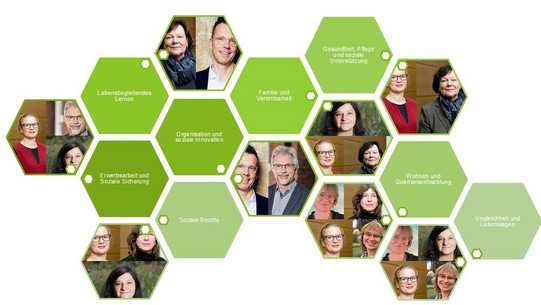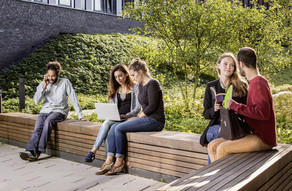Research program

Aging societies are societies that need to constantly reinvent themselves - this applies to political and social levels, i.e. regarding institutions and social relations, as well as to the everyday life of each individual. Being old today is not the same as being old tomorrow. When societies age, it affects not only the "old" or the increasing proportion of older and very old people in the population, but everyone, including children, young, and middle-aged people. It affects individuals and families as well as the entire health and social system, the pension system, and how we live and work together. We are becoming "fewer, older, more diverse" - this is a global "megatrend" that is accompanied by fundamental social changes for everyone and brings with it a wide range of challenges. Especially in times of multiple crises (pandemics, wars, climate) with profound social and economic consequences, all this is of fundamental importance for ensuring participation, good living and working conditions, and social solidarity.
The research training group studies the new challenges caused by demographic change in times of multiple crises (pandemics, wars, climate) for individuals, families, and societies and asks: How can self-determined aging be made possible for all in central areas of life and over the entire life course? How can we ensure generationally appropriate social participation in aging societies? From a multi-methodological and interdisciplinary, multilevel perspective, the twelve doctoral theses are situated in eight closely interrelated thematic areas. We outline possible research questions below.
I. Gainful employment and social security (Brandt, Howaldt, Motakef)
How should pension systems in aging societies be structured to ensure participation? If age-related needs of employees are to be taken seriously, how must gainful employment be modified?
II Organization and social innovation (Howaldt, Wilkesmann)
What socially innovative organizational approaches and solutions are available to ensure participation in organizations? What is the importance of digital technologies in this context?
III Lifelong learning (Reichert, Wilkesmann)
How can lifelong learning be organized so that certain groups of people are not systematically disadvantaged? How can knowledge transfer be ensured in companies?
IV. Family and reconciliation (Brandt, Motakef, Reichert)
How do the living conditions and participation opportunities of caregivers change due to demographic change? What impact do the (changing) legal, socio-political, and operational conditions for families have on this? What are the consequences for gender inequalities?
V. Health, care and social support (Brandt, Reichert)
How can care succeed in the sense of good and self-determined, healthy aging for caregivers and for those who receive care? How can care conditions be improved? How do labor migration, social networks, regional services, technological developments, and pandemic crises affect this?
VI Housing and neighborhood development (Burzan, Brandt, Frank, Poferl)
What housing concepts are needed that are no longer oriented towards the middle-class nuclear family? How can housing policy be designed in a generationally appropriate way? How can loneliness be addressed, not only but especially in old age?
VII Social rights and justice (Brandt, Motakef, Poferl)
How is intergenerational justice developing with regard to co-determination and participation in times of crisis? To what extent does it make a difference if, for example, the focus is on social security or climate protection?
VIII. Inequality and life situations (Brandt, Burzan, Frank, Motakef)
How do (unequal) participation opportunities develop over the life course and the family cycle? What possibilities for intervention can be identified? How do different ways of living affect the reproduction of inequalities, and what changes over time? Do "queer" people age differently and if so, what does this mean for life course research?
The research training group not only aims to fill significant research gaps, but also to identify challenges and to (further) develop participation-oriented measures to ensure participation in aging societies. The project is based on multiperspectivity and uses elaborate and innovative quantitative, qualitative, combined, and transformative methods. A broad set of measures systematically promotes the regional, national, and international visibility of the research results, the sustainable transfer and networking possibilities among the research scholars with the involvement of stakeholders from politics and business.





